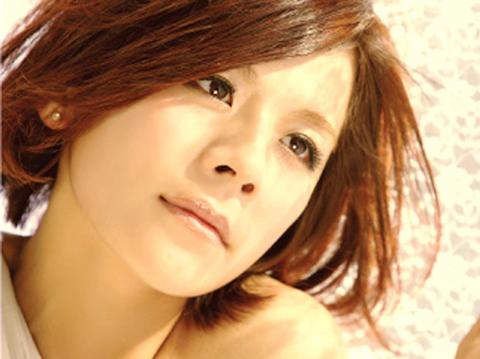Mando-pop songstress Maggie Chiang (江美琪) wants to prove she can do more than tug at your heartstrings with her voice; she can write her own songs too.
Chiang, whose full-length albums include 2006’s Cry Baby (愛哭鬼), is releasing My Room (房間), her 10th album and first to comprise all self-penned material. The pop siren performed a sold-out concert at Legacy Taipei (傳音樂展演空間) on May 25 and will play a six-song set at Taipei gay club G-Star at midnight on June 8.
“I want my music to be warm and uplifting,” the graceful singer told the Taipei Times. “I want the audience members to relive their emotional memories through me.”

Photo courtesy of XY Music
Now aged 31 and dubbed a “therapeutic singer” (療傷系歌手) by the Chinese-language media because of her poignant delivery of heartfelt ballads, Chiang achieved stardom based on her entrancing renditions of hits such as How I Envy You (我多麼羨慕你), the theme song to the blockbuster TV period drama April Rhapsody (人間四月天), and He Must Really Love You (他一定很愛你).
Chiang did not muster up the courage to write her own songs until signing with her current label XY Music. She used her iPhone to record snippets of melodies that came to her, and then patched together the nine tracks on the album.
“I mostly hum tones when I am comfy and relaxed in my room,” she said. “There were a few times when riveting melodies hit me halfway through a shower, so I simply rushed out to get my phone and recorded them.”
Musically, My Room is Chiang’s most personal journey to date. Set against a heart-warming backdrop of swirling violin and piano, the title track pays tribute to the memory of her older brother, who passed away from cancer two years ago. Also on the album, Perfect Breakup (完美分手), the latest addition to her long string of contagious romantic odes, recounts her decision to bid a graceful adieu to a former beau.
“I told him that love had vanished, and I simply packed up and left that night,” she said.

That US assistance was a model for Taiwan’s spectacular development success was early recognized by policymakers and analysts. In a report to the US Congress for the fiscal year 1962, former President John F. Kennedy noted Taiwan’s “rapid economic growth,” was “producing a substantial net gain in living.” Kennedy had a stake in Taiwan’s achievements and the US’ official development assistance (ODA) in general: In September 1961, his entreaty to make the 1960s a “decade of development,” and an accompanying proposal for dedicated legislation to this end, had been formalized by congressional passage of the Foreign Assistance Act. Two

Despite the intense sunshine, we were hardly breaking a sweat as we cruised along the flat, dedicated bike lane, well protected from the heat by a canopy of trees. The electric assist on the bikes likely made a difference, too. Far removed from the bustle and noise of the Taichung traffic, we admired the serene rural scenery, making our way over rivers, alongside rice paddies and through pear orchards. Our route for the day covered two bike paths that connect in Fengyuan District (豐原) and are best done together. The Hou-Feng Bike Path (后豐鐵馬道) runs southward from Houli District (后里) while the

March 31 to April 6 On May 13, 1950, National Taiwan University Hospital otolaryngologist Su You-peng (蘇友鵬) was summoned to the director’s office. He thought someone had complained about him practicing the violin at night, but when he entered the room, he knew something was terribly wrong. He saw several burly men who appeared to be government secret agents, and three other resident doctors: internist Hsu Chiang (許強), dermatologist Hu Pao-chen (胡寶珍) and ophthalmologist Hu Hsin-lin (胡鑫麟). They were handcuffed, herded onto two jeeps and taken to the Secrecy Bureau (保密局) for questioning. Su was still in his doctor’s robes at

Mirror mirror on the wall, what’s the fairest Disney live-action remake of them all? Wait, mirror. Hold on a second. Maybe choosing from the likes of Alice in Wonderland (2010), Mulan (2020) and The Lion King (2019) isn’t such a good idea. Mirror, on second thought, what’s on Netflix? Even the most devoted fans would have to acknowledge that these have not been the most illustrious illustrations of Disney magic. At their best (Pete’s Dragon? Cinderella?) they breathe life into old classics that could use a little updating. At their worst, well, blue Will Smith. Given the rapacious rate of remakes in modern